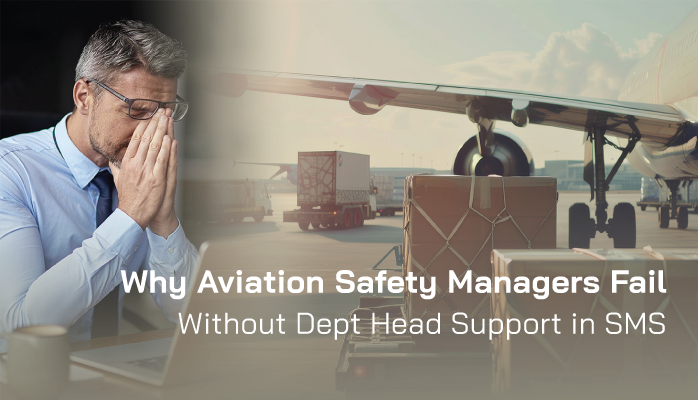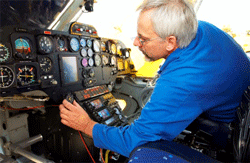Problem of Aviation SMS Entirely Left to Safety Managers

For many aviation service providers, implementing and sustaining aviation safety management system (SMS) remains the sole province of the safety managers. This is true whether you are an:
- Airline
- Airport;
- Aviation maintenance organization (AMO or MRO);
- FBO;
- ANSP; or
- Small private or charter operator.
This is an observation I'm continuing to see across the world; however, we are seeing perceptible changes in Canada and Australia.
The practice of Department Heads taking a more active role in aviation SMS is slowly becoming more noticeable in Canada and Australia because operators in these countries have more advanced SMS due to their early adoption and adherence of ICAO's 2006 mandate.
Another important contributing factor to these more mature SMS is the relative lack of corrupt business practices in these countries. Regulatory oversight is more reliable and their civil aviation authorities contribute significant resources to mentor and encourage operators to embrace the tenets of SMS.
Another personal observation is that aviation safety managers appear to be better trained and knowledgeable about risk management processes than safety managers from other countries. This is a bold statement and please don't consider it a blanket statement that disparages safety managers outside Canada and Australia.
Another personal observation garnered from over a dozen years of empirical evidence is that there are more expatriate safety managers from Canada and Australia than from other countries. I have never seen a statistic to verify this, but it would be interesting to discover the veracity of this observation.
Related Aviation Safety Manager Articles
- What Makes a Good Aviation Safety Manager?
- Career Advice for Aspiring Safety Managers
- Why/When Aviation Safety Managers Don't Need Operational Experience
Regardless of which country you live or work in, SMS programs will fail at phase 3 of SMS implementation without Department Head support. I don't care if you have the most highly educated, charismatic safety manager on the planet. Your SMS will fail when your operational leaders possessing risk acceptance authority within their area of operation are shunning their SMS duties and responsibilities.
Aviation Safety Managers Doing All the Work
In the early Phase 1 and Phase 2 of SMS implementation, a safety manager may cobble together an audit-worthy SMS program. This organization's immature SMS program will certainly survive the early years because regulatory and client auditors are focusing on;
- Visible top management support;
- Safety policies;
- Duties and responsibilities of key safety personnel;
- Reactive risk management (hazard reporting and treating reported issues);
- Implementation plans;
- Safety promotion activities and safety communication; and
- Reactive risk management training.
In many cases, a safety manager can pencil whip an SMS together by themselves, but many aviation service providers solicit help from:
- SMS consultant; or
- Local SMS consulting companies.
The SMS consultant or consulting company may deliver an SMS manual and basic SMS theoretical training. As the consultant leaves, the operator may believe they have a healthy, but nascent SMS. All is well.
Fast forward two to three years...
An aviation service provider may survive audit scrutiny for up to three years with such a system we described above.
In less ethical cultures, an SMS auditor will conveniently "overlook" shortcomings in the hopes of earning future "auditing fees." After all, who wants to continue paying good money to auditors when they are nothing but trouble? This practice has been repeatedly reported to us by visitors from Eurasia, Asia, and the Middle East. Do you remember earlier in the article when I referred to the lack of corrupt business practices? This is one practice that causes concern about the validity of aviation SMS in certain countries.
Related Aviation SMS Auditing Articles
- How Often Should You Conduct Aviation SMS Audit
- How to Think Like an Aviation SMS Auditor
- Aviation Safety Audits 101: Prep and Pass [Free Audit Checklists]
Bulling Your Way Through Phase 3

Safety managers may begin to tackle Phase 3 requirements without department heads' physical support. This is not a recommended practice as a key activity in Phase 3 is proactive hazard identification. There are times when a safety manager can pull this off, such as:
- When the safety manager has considerable operational expertise; and
- When the affected operations are small and not complex.
When a safety manager lacks operational experience, there is no way to adequately:
- Document identified hazards;
- Document realistic risk scenarios;
- Identify existing control measures;
- Evaluate effectiveness of risk controls;
- Conduct initial risk assessments;
- Determine if ALARP is achieved (as low as reasonably practical);
- Schedule additional control measures when necessary; and
- Perform residual risk assessments.
These same activity requirements remain applicable to larger and more complex operations. There is no way for one person to possess adequate subject matter expertise to perform a complete proactive hazard analysis on the entire company. In most cases, a team of managers is required, consisting of the chief pilot, LAME, or other department heads that intimately understand the hazards, risks, and implemented control measures.
If you object to this logic, think about this for a moment. The department head is responsible for managing hazards in his/her area of operations. In order to sleep at night, he has to accept the risk of the hazard manifesting itself into an undesirable state. The department head has risk acceptance authority for this hazard. We've also seen "committees" having risk acceptance authority in larger operations.
The Department Head is the subject matter expert. He needs to be involved in documenting hazards, risk consequences, and control measures. Also, keep in mind that this "List of Hazards" will be your Hazard Risk Register.
Safety Managers May Fake It for a While
A complete proactive hazard analysis is not a trivial exercise. Considerable documentation is required. Best practices dictate that the proactive hazard analysis and regular review be performed by a team to:
- Distribute the workload;
- Have a more professional and complete analysis; and
- Pull on the wealth of available subject matter experts.
Leaving this task to a safety manager is cruel. The safety manager must communicate the necessity that operational managers require for this Phase 3 requirement. We cannot expect department heads to be omniscient and know that this activity is required. It is the responsibility of the safety manager to train department heads regarding this requirement. Your hazard identification and risk management depend on it!
Related Aviation Hazard Identification Articles
- From Reactive to Proactive Hazard Identification in Aviation SMS
- 4 Pillars | What Is Hazard Identification in Aviation SMS
- How to Be Compliant With Hazard Identification in Aviation SMS
Safety Managers Cultivate Healthy Culture of Shared Responsibility
Without support and active involvement from department heads, your SMS remains in jeopardy and your company is at risk of losing business from clients demanding demonstrable proof of a valid proactive hazard management program.
How will you cultivate relationships?
How will you change the mindsets of old-school department heads who believe, if it is an SMS item, let the safety manager deal with it?
I become sad when I hear stories of safety managers undergoing grueling, highly intensive audits and the other department heads don't have the interest to ask the safety team:
"How did we do?"
"What can we improve upon?"
When there is no indication of interest from upper-level managers, you know your aviation SMS is either:
- Doomed;
- Slowly dying; or a
- Paper sham.
There must be training given to department heads as to their duties and responsibilities to the SMS. An SMS is for the company's benefit, and not just for the safety management team to be gainfully employed.
I can see two tactics safety management teams can employ to ensure operational managers are reminded of their role in the SMS. The first is to document a read and sign relating to their safety accountabilities. The second approach allows for more active monitoring.
"Safety accountabilities" document what is expected of each type of employee. Low-cost, commercially available SMS databases have tools to automatically document the regular review of safety accountabilities. Check it out.
Free Safety Accountabilities Templates to Download
Another approach is to monitor the activities of managers with specific assigned responsibilities. This approach can allow for short-term monitoring, which ensures there are no surprises when the auditor comes.
Last updated January 2025.








